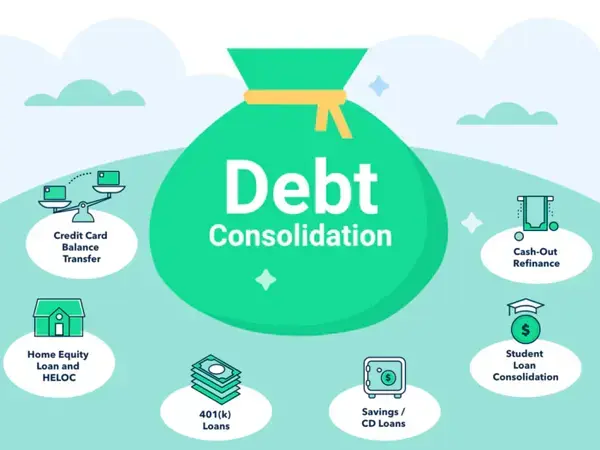1. Personal Loans:
Personal loans are a popular choice for debt consolidation due to their flexibility and relatively low interest rates, especially for borrowers with good credit. With a personal loan, you can consolidate multiple debts into one, potentially securing a lower interest rate than what you're currently paying on your credit cards. Additionally, personal loans often come with fixed interest rates and structured repayment terms, making budgeting easier and providing a clear timeline for debt repayment.
2. Balance Transfer Credit Cards:
Balance transfer credit cards offer an alternative method for consolidating credit card debt. These cards allow you to transfer existing balances from high-interest credit cards to a new card with a lower or 0% introductory APR (Annual Percentage Rate) for a limited time, typically ranging from 6 to 18 months. By taking advantage of a balance transfer offer, you can potentially save money on interest charges and pay down your debt more quickly. However, it's essential to pay close attention to the terms and fees associated with balance transfers, including any balance transfer fees and the ongoing interest rate after the introductory period ends.
3. Home Equity Loans or Lines of Credit:
For homeowners with substantial equity in their homes, a home equity loan or home equity line of credit (HELOC) can be an option for consolidating debt. These loans allow you to borrow against the equity in your home, typically offering lower interest rates than unsecured loans or credit cards. However, using your home as collateral carries inherent risks, as failure to repay the loan could result in the loss of your home. It's crucial to carefully assess your ability to repay before considering a home equity loan or HELOC for debt consolidation.
4. Debt Management Programs:
Debt management programs, offered by credit counseling agencies, provide an alternative approach to debt consolidation. These programs involve working with a credit counselor to create a repayment plan that fits your budget. The credit counselor may negotiate with creditors to lower interest rates or waive fees, making it easier to repay your debts over time. While debt management programs can be effective for some individuals, it's essential to research reputable credit counseling agencies and understand any fees associated with the program.
5. Peer-to-Peer (P2P) Lending:
Peer-to-peer lending platforms connect borrowers with individual investors willing to fund their loans. P2P loans can offer competitive interest rates and flexible repayment terms, making them a viable option for debt consolidation. However, eligibility criteria and interest rates vary depending on the platform and investors' risk preferences. Borrowers with good credit may qualify for lower rates, while those with less-than-perfect credit may face higher interest charges.
Choosing the Right Loan for Debt Consolidation:
When selecting the best loan for debt consolidation, consider factors such as interest rates, fees, repayment terms, and your overall financial situation. It's essential to compare offers from multiple lenders, carefully read the terms and conditions of each loan, and assess the total cost of borrowing before making a decision. By taking a strategic approach to debt consolidation, you can regain control of your finances and work towards a brighter financial future.

